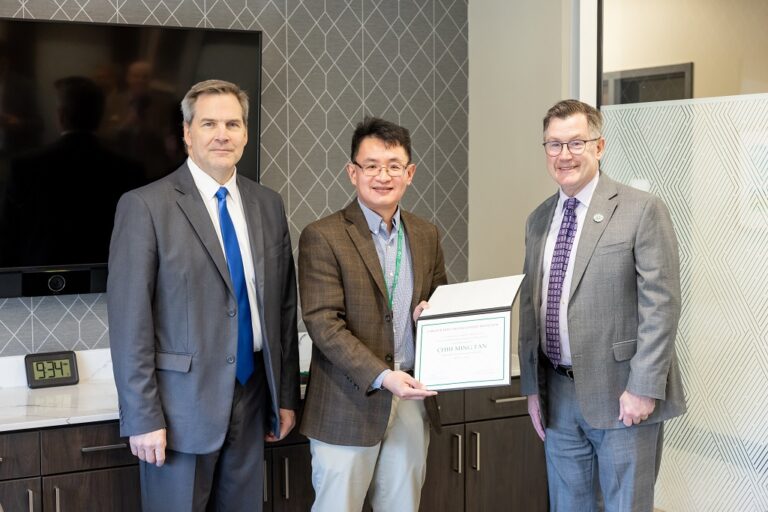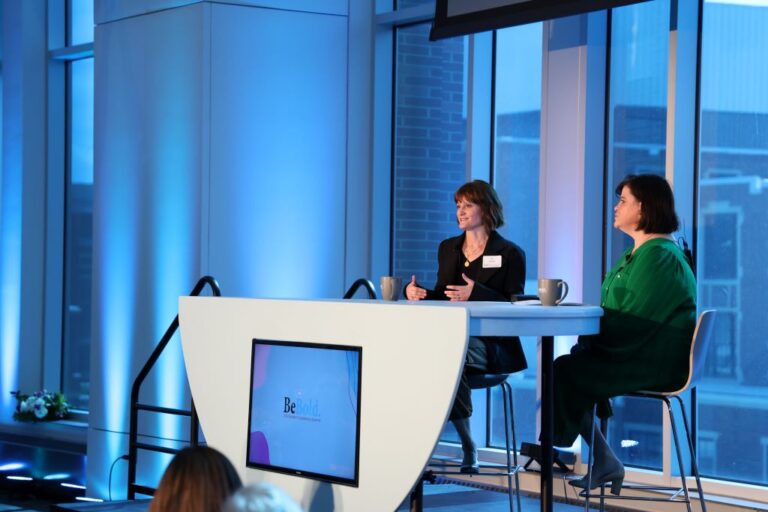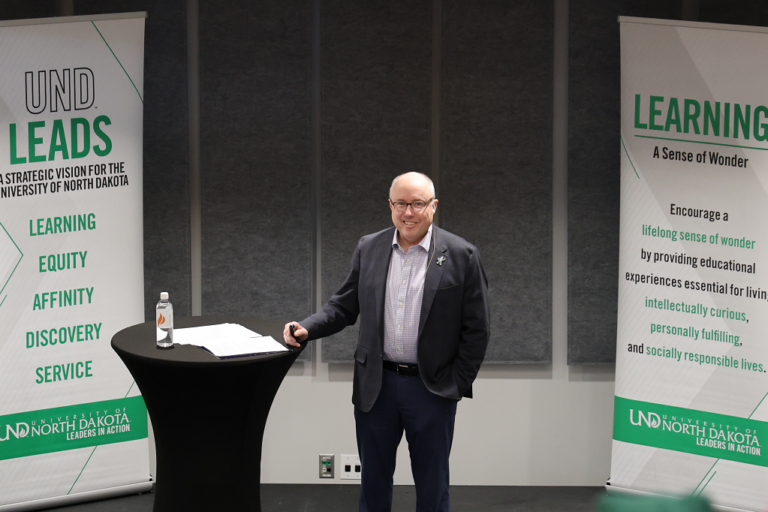Celebrating 100 years of UND Psychology
Students and staff from past and present rejoice, reminisce at department’s PsyCentennial event

Psychology has long been a part of UND’s curriculum, with courses related to the discipline appearing in several curriculum areas as early as the 1886-1887 academic year, according to the late Ralph Kolstoe’s history of the department.
While the discipline has undergone many changes since then, the Psychology faculty at UND have remained steadfast in their commitment to addressing the field’s training and research needs since the department’s formal establishment in 1923.
On Saturday, April 15, the Department of Psychology celebrated not only its own 100-year milestone, but also two other notable achievements: the 50th anniversary of the department’s Clinical Ph.D. program, and 30 years of the INPSYDE, or Indians into Psychology, program. An open house and celebration marked the events.
The open house was well attended, with guests filling the large, open area on the lower level of Columbia Hall, the Psychology Department’s home on campus. Refreshments and research displays — showcasing current studies from the department’s undergraduate, clinical, experimental and forensic programs — were set up around the perimeter, and tours of the Northern Prairie community clinic, Research Center and building showed off a Psychology space that was new to many attendees.
Current students were also on the main floor, presenting their research on topics ranging from forensic psychology to student involvement and success studies.
Lauren Stornelli, a doctoral student in the Experimental Psychology program, was there to present her research on gait as a factor in identifying suspects in criminal investigations. She said that gait is a new biometric cue, much like fingerprints, that law enforcement can use to identify suspects via surveillance footage.
“We found that among multiple identification factors, gait may actually supersede other traits in surveillance footage,” she said. “There can be pixelation issues that distort certain physical features, but someone’s gait is more or less distinctive.”
She said that she’s interested in seeing if this type of research can increase identification and witness reliability as she continues to conduct research for her dissertation.
Christopher Veenstra, also a doctoral student in the Experimental Psychology program, presented his research measuring subjects’ ability to identify a specific stimulus in different circumstances. Veenstra said that research like his potentially can train doctors to identify cancerous moles.
“It’s been a great turnout, and I’ve gotten the chance to talk to some past graduates. It’s been cool to see their perspectives on the continuing legacy of the department,” Veenstra said.
Heather Terrell, director of Psychology undergraduate programs, also found the community-driven celebration heartening. She had the chance to meet with students from the early years of her teaching.
“I just got to see a student who was probably the second Ph.D. student I’d supervised. Now she’s practicing in Fargo and helping to supervise our clinical students,” Terrell said.
When asked how the open house had gone so far, Terrell said the atmosphere was one of pride.
“There’s a lot of pride, and I think the department has a lot to be proud of. It’s great to see how far the department has come since its beginning,” she said.
“We’re also really proud of our clinical program, which is the only program of its kind in the state. It’s been great to see how much we’ve served the state through our department,” referencing the department’s Clinical Ph.D. program, which is celebrating its 50th anniversary this year.

Elizabeth Alexander, one of the students providing tours at the open house, is a clinical graduate student participating in INPSYDE (Indians into Psychology Doctoral Education) program, which is celebrating its 30th anniversary this year. The program, which serves to build pipelines between UND and tribal colleges and to train Native American students to become clinical psychologists, has been meaningful to Alexander.
“I applied to several schools, but I’m really glad that I ended up at UND,” she said. “The other schools I applied to didn’t have anything like this, and I really needed something like the INPSYDE program. It’s made my experience at UND really great so far.”
The program’s director, Doug McDonald, shared some thoughts on the program’s legacy following the event, saying, “The UND INPSYDE program has to date graduated more American Indians with Ph.D.’s in clinical psychology than any other program in the country.”
“Its success is fueled by the outstanding support of the departmental faculty, College of Arts and Sciences and UND administration as a whole, as well as the regional and national tribal partners entrusting us with their young scholars’ development, well-being and training,” he continued.
“We look forward to another 30 years of growth and success. Ultimately, it’s the tribal communities, both rural reservations and urban Indian centers, that benefit the most from it.”
At the tail end of the open house, McDonald led a smudging ceremony to remember late UND psychology professor Cheryl Terrance, as well as celebrate the department’s milestone anniversary.
In a large circle surrounding McDonald, attendees shared memories of Terrance and discussed her impact and legacy. McDonald called her a “staunch defender and champion of the underdogs,” with exceptional compassion and a sense of humor that permeated her life and career.

Following the open house, attendees gathered in the Memorial Union’s Large Ballroom for an evening of dinner, dancing and the marquee event for the night: a roast of Tom Petros, a longtime faculty member and a Chester Fritz Distinguished Professor of Psychology.
Before the dinner began, Department Chair Joelle Ruthig, Doug McDonald, UND President Andy Armacost, and former UND Psychology student Paul Kolstoe delivered speeches reflecting on the department’s legacy.
Paul Kolstoe, the son of UND Psychology professor and author of the department’s departmental history, Ralph Kolstoe, gifted a framed caricature of his late father to the department. Ruthig called this gift “a wonderful tribute to Ralph’s legacy within our department.”
After dinner, the roast of Tom Petros took place. Several of Petros’ longtime colleagues took turns telling lighthearted jokes at Petros’ expense and reflected fondly on his long career with the University.
Petros, a well-known supporter of local arts and former president of the North Dakota Ballet Company, took the barbs in stride, laughing with the audience as Jeffery Weatherly, Richard Ferraro, Bill Beckwith and Mark Grabe performed their roasts.
The stories painted Petros as an eclectic and respected individual who wore many hats over his career: a professor, a friend, a mentor, a baby sitter, a singer, and even ballet dancer.
When asked how much of the roast was accurate, Petros smiled and said, “All of them. I really did dance with the North Dakota Ballet Company for six years before I hung up my tutu.”
The audience, and Petros himself, seemed to relish the dissection of the professor’s life and personality. It was a fitting end to the communal celebration of a department anchored by its curiosity about the complexities of human behavior.

Ruthig said she was pleased with how the day’s festivities went.
“Thanks to the efforts of many faculty, graduate students and staff, the event was a big success. It gave alumni the opportunity to learn about some of the exciting training and research initiatives happening within the department,” she said. “It was also wonderful to catch up with former faculty and students and to hear about what they are up to in their lives now.”
Petros agreed, and in his post-roast speech, he noted, “We’re all very proud of the work we do and the people who have graduated from our department. When it’s showtime, we all pull together to do our thing — and that’s really wonderful.”



